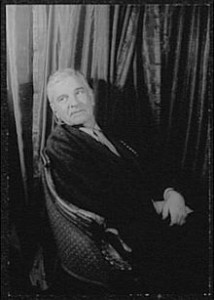[contextly_auto_sidebar id=”Gjg4drHdDm8TMo6CAVQekqDcci6u6t5u”]
FOR a few days now, I’ve been discussing the ideology of one of the nation’s most storied magazines, with friends on both left and right; for many, it’s best known as a policy journal. But the reason I am most saddened by the destruction of a great publication by a Silicon Valley coup has nothing to to with politics, no matter how valuable TNR was to American liberalism (a tradition I value greatly.) I’m angry because of Malcolm Cowley (pictured) — the elegant literary critic/ memoirist who is one of many great figures from the magazine’s cultural side, and has served as an inspiration to me as a writer from college to the present.
The survival of an informed, fair, artfully written discourse outside the academy is vastly important to me, perhaps rivaled only by a serious and healthy environment for the arts and letters. Both are in short supply these days, despite the explosion of blogs, sites, and everything else. While every issue of TNR may not have reached the heights established by the author of Exile’s Return, that great book that chronicled the Lost Generation writers, it was often one of the most vital voices in the larger conversation. Like Cowley (who J. Edgar Hoover tried to get fired), I am to the left of the magazine that once helped torpedo national healthcare, for instance. But this is less crucial to me. (A friend has suggested that TNR was in some ways “two magazines.”) There is plenty of political opinion available, on all sides of the spectrum, online.
Anyone who cares about culture and discourse should lament the implosion of this magazine by new owners who crow about “disruption” and “branding” — incisive Jonathan Chait piece here — regardless of their politics. “Conservatives need a liberal magazine that’s unpredictable enough to make them want to read it,” historian and former TNR editor David Greenberg wrote. “Liberals and leftists need a magazine that will prod them to question their beliefs, and revise or strengthen them. All of us need robust intellectual debate of a high caliber that treats politics and ideas with the seriousness that they deserve.”
So while I do regret that one of the key journals of the center-left has been radically redrawn — and that it will now publish less often — I find myself mostly agreeing with a commentator in some ways very different from me, the Catholic conservative Ross Douthat. He writes in the New York Times:
The New Republic as-it-was, the magazine I and others grew up reading, was emphatically not just a “policy magazine.” It was, instead, a publication that deliberately integrated its policy writing with often-extraordinary coverage of literature, philosophy, history, religion, music, fine art.
It wasn’t just a liberal magazine, in other words; it was a liberal-arts magazine, which unlike many of today’s online ventures never left its readers with the delusion that literary style or intellectual ambition were of secondary importance, or that today’s fashions represented permanent truths.
Unlike our era’s ascendant data journalism, it also never implied that technocracy was somehow a self-sustaining proposition, or that a utilitarianism of policy inputs and social outcomes suffices to understand every area of life.
The recent 100th anniversary issue reminded us how much tension had often existed between respective owners and the editors; Ric Hertzberg’s essay made this especially clear. But this nonsense with the new ownership is something different.
Some talk about the magazine declining lately, but I found a lot of memorable writing there, including Jed Perl’s art criticism and William Deresiewicz’s controversial and widely read “Excellent Sheep” essay about the narrowness of Ivy League education.
TNR’s new CEO, Guy Vidra, replicated all the right Silicon Valley buzzword when he talked about wanting to “break shit.” Well, he certainly has. He and the new owner wanted a “vertically integrated tech company,” and what they’ve got now is a smoking ruin.


Personally, I think the magazine – and especially the TNR website – had gotten better under Chris Hughes, not worse. Certainly, with Martin Peretz out of the picture, TNR’s main source of embarrassment in the past few years was gone.
I know that, before October, some of TNR’s staff may have been nervous about where TNR might be going – but were they more nervous than most serious long-form journalists are these days?
If we can believe departed editor Julia Ioffe, most of the editorial staff of TNR was fine with expanding the website, and most were willing to accept that cutting the frequency of the print magazine in half probably had to be done.
But that was before October. From what I’ve read, I suspect the problem was Guy Vidra, charging in from Silicon Valley “to break shit”.
I can’t help thinking that this sad situation could be at least partly fixed if Vidra left and Hughes hired a CEO with some interpersonal skills.
(That might well mean finding someone from an industry and a place that’s not peopled largely by poorly socialized tech geeks.)
TNR has for years been a room of mostly elite, male, all white people talking to and about other white people, with some of them expressing or supporting openly racist beliefs (Sullivan, Peretz, etc.) about people who aren’t white, others pontificating about people who aren’t white, and quite a few writing as if people who aren’t white don’t exist. This is called intellectual apartheid. It’s now being run into the abyss by more and richer white men who have no regard for those all white conversations, and want to “break shit.” Oh well. Maybe by accident they’ll bring this rag into the 21st century, without the racism and intellectual apartheid, if they haven’t completely destroyed it.